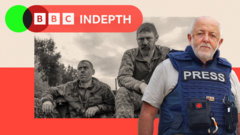Three years have passed since the onset of the Russian invasion, and while Kyiv appears revitalized, with bustling shops and traffic jams, the specter of national extinction haunting Ukraine has resurfaced. The ominous shift began with a phone call on February 12, when former US President Donald Trump reached out to Russia’s Vladimir Putin, igniting fears reminiscent of those felt when war first broke out in February 2022. Many Ukrainians feel uneasy about Trump's distorted narrative of the conflict, which includes claims that Ukraine instigated the war, undermining President Volodymyr Zelensky’s rightful place in negotiations regarding his nation's future.
Experts observe that Trump’s negotiating tactics, which prioritize concessions before meaningful talks, further complicate the situation. Rather than pressuring Russia, he has offered territorial compromises, including acknowledgment that Ukraine will not join NATO and that Russia can retain some of its forcibly seized territory. This has prompted skepticism regarding Western support for Ukraine, especially following recent talks between US officials and Russia that left Ukrainians feeling vulnerable.
In a recent meeting in Kyiv, Ihor Brusylo, a senior advisor to President Zelensky, conveyed the pressure Ukraine faces amidst Trump's verbal jabs and shifting diplomatic stance. "These are very hard, challenging times," Brusylo stated. Despite the shifting tides, Ukrainians remain resolute in their fight for independence, echoing sentiments from three years prior.
As life in Kyiv continues amid the backdrop of war, with nightly missile alerts still a norm, the country wrestles with the reality that the frontline – stretching over a thousand kilometers from the northern border down to the Black Sea – remains dangerous and fraught with devastation. Towns once bustling with life lie in ruin while Ukrainian forces engage in slow, deadly battles with Russian troops in Donetsk and Luhansk.
At the forefront of this struggle are the soldiers fighting on the lines, who express a sense of urgency about their homeland's survival. Many young individuals have shifted from their civilian lives into military roles, understanding that their country’s fate is in their hands. Amid these harsh realities, soldiers express doubt about the reliability of foreign aid, with one stating: "Help is not something that can last forever."
Maxsym Lutsyk, a 22-year-old combat veteran, reflects on the sweeping changes war has inflicted on his generation and on international dynamics. He likens Trump’s diplomatic tendencies to the flawed appeasement tactics employed by historical figures like Neville Chamberlain, warning that such strategies exacerbate the threat posed by aggressor states.
As Europe grapples with the precursors of warfare, its leaders face the monumental task of ensuring their young people can avoid being caught up in the conflict that has irrevocably reshaped the lives of countless Ukrainians. The underlying tension of having one’s sovereignty at risk looms large, while the fabric of European security hangs in the balance as the specter of war continues to unfold.



















